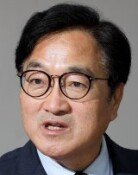N. Korea Launches New Verbal Attacks on S. Korea, US
N. Korea Launches New Verbal Attacks on S. Korea, US
Posted January. 19, 2009 03:04,
North Korea has launched a series of verbal attacks against South Korea and the United States ahead of Barack Obama`s inauguration as U.S. president and the second anniversary of South Korean President Lee Myung-baks administration.
At 11:59 a.m. Saturday, the North`s state-run Korean Central News Agency released a statement from the Norths Foreign Ministry spokesman urging denuclearization of the Korean Peninsula.
At 4:49 p.m. the same day, the spokesman for the chairman of the general staff of the North`s Korean People`s Army pledged an all-out confrontational stand against the South.
And at 5:10 p.m., a North Korean subcommittee for implementing the 2000 inter-Korean joint declaration denounced the Souths efforts to beef up anti-communist education.
Wearing a colonel`s uniform, the spokesman for the (North) Korean People`s Army also appeared Saturday in a TV program on the (North) Korean Central Broadcasting Station to criticize Seouls hard-line policy toward Pyongyang.
Our revolutionary armed forces will take an all-out confrontational posture against South Korea to crush its confrontational policy, he said.
No spokesman for the North Korean army`s general staff has appeared on TV since December 1998, when Operational Plan 5027, a basic war plan formulated by the South Korea-U.S. Combined Forces Command, was established.
The statement Saturday was also the general staffs first since 1999, when it refused to recognize the Northern Limit Line, which has served as the de facto maritime border between the two Koreas.
Experts say the surprise TV appearance of the military spokesman was aimed at getting the attention of the incoming Obama administration, softening Seouls policy toward Pyongyang, and strengthening its power structure by creating inter-Korean tension.
"Normalization of diplomatic relations and the nuclear issue are entirely different issues," a spokesman for the North`s Foreign Ministry said in a statement. "Even if diplomatic ties with the U.S. are normalized, our status as a nuclear state will never change as long as the U.S. nuclear threat remains even a bit."
Ironically, the ministry spokesman said Tuesday that the communist regime was planning to denuclearize after Pyongyang and Washington establish diplomatic ties.
Kim Seong-han, an international studies professor at Korea University in Seoul, said the Norths sudden change of stance shows an ulterior motive to hold disarmament negotiations with the United States as a nuclear power.
Pundits say Pyongyang will likely focus on bilateral dialogue with Washington rather than the six-party talks to stress its status as a nuclear nation.
The North`s military spokesman also rejected the Northern Limit Line and Pyongyangs intent to preserve its own inter-Korean western sea border, implying a potential arms conflict in the Yellow Sea.
This is seen as an attempt to gain the upper hand in upcoming talks with the South by escalating military tension in the disputed sea border.
Seoul has refrained from making provocative remarks against Pyongyangs statements while closely monitoring the Norths military movements.
The Joint Chiefs of Staff in Seoul ordered South Koreas armed forces to raise alert levels at 6 p.m. Saturday, the first since October 9, 2006, when the North carried out a nuclear test.
South Korean military authorities have also strengthened surveillance of the North Korean military around the Military Demarcation Line. They have also reportedly asked U.S. forces in South Korea to beef up intelligence gathering activities against the North using U-2 spy planes.







